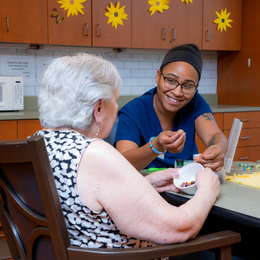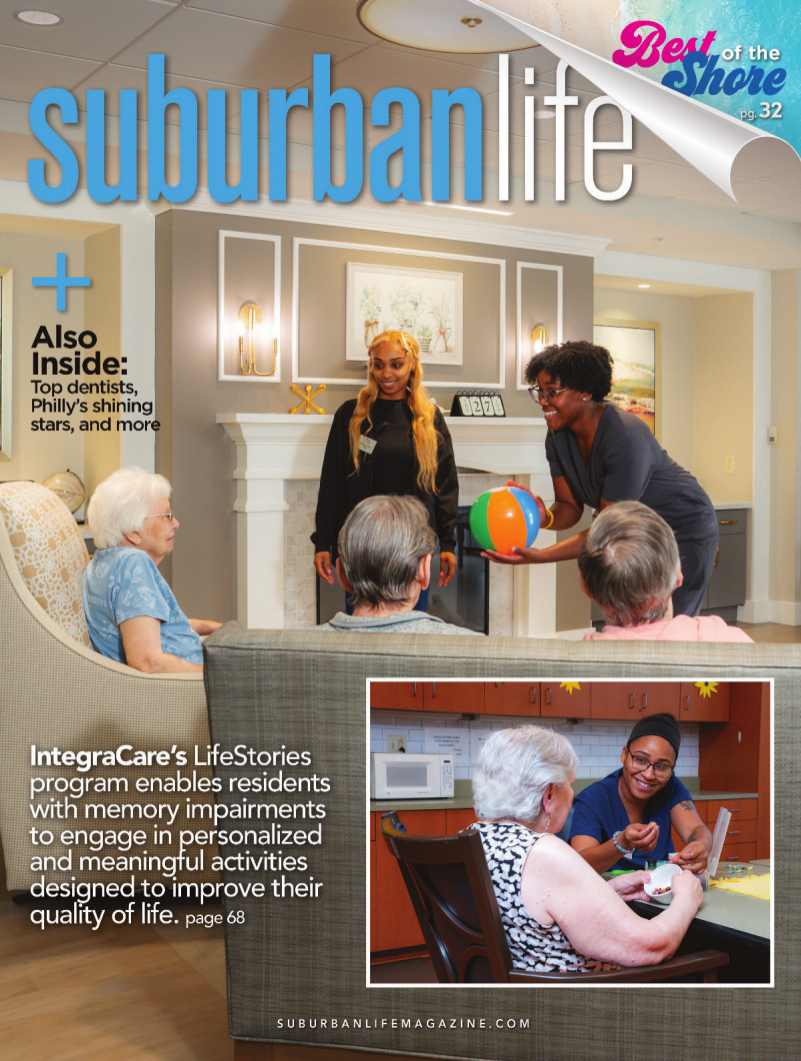
A New Chapter
IntegraCare’s LifeStories program enables residents with memory impairments to engage in personalized and meaningful activities designed to improve their quality of life.
Stories have power. They enable us to connect with the world around us, help us to better understand others as well as ourselves, and give our lives meaning and purpose.
Stories become especially important later in life, according to Larry Rouvelas, the CEO of IntegraCare, which operates 18 senior living communities in Maryland, Pennsylvania, and Virginia, including two in the Philadelphia area: Exton Senior Living and Glen Mills Senior Living. In fact, he says stories are the backbone of an innovative program for IntegraCare residents who have memory impairments such as Alzheimer’s disease and other forms of dementia.
“By the time we reach our 80s, just about all of us are going to have some degree of memory loss,” he adds. “As much as you hope to change the trajectory of the disease, you also hope to create pleasant days for people who are suffering from the disease process. We can do that here in a safe, comfortable, and dignified way.”
IntegraCare’s LifeStories Memory Care Program strives to create an environment in which residents engage in meaningful activities designed to improve their quality of life. Relying heavily on in-depth interviews with residents’ family members, the personalized program aims to preserve residents’ remaining cognitive skills and abilities, if not enhance them.
Rouvelas cites a LifeStories resident named Joe who would periodically get agitated and confused. As part of their continuous dialog with his family, Joe’s care team learned that he previously enjoyed a fulfilling career as a bookkeeper. They then used this information to come up with a solution: They presented him with a sheaf of paperwork for him to process “so we could get some shipments out.” As Joe got absorbed in the work, his agitation faded.
“He knew how to do the work well, and it put him back in his comfort zone,” Rouvelas says. “We could do that because we were able to understand his life story. Our residents come from all different backgrounds—health care, hospitality, steel mills, you name it. Whatever background they came from, we find out what was important to them and then create space for them.
“No matter how old we get,” he continues, “the urge for purpose doesn’t change. Helping people recapture that feeling is part of how we help them have a sense of belonging.”
Close-Knit Communities
At Exton Senior Living, a three-person team with 40 years of combined experience ensures a high level of care for residents in the community’s 16-room LifeStories program. Even so, Casey Counseller, Exton’s executive operations officer, sees memory care as a collaboration between team members and residents’ families. A resident’s family members will not only notify staff of any changes in behavior that might necessitate an adjustment to the care plan, but also add to the sense of community in the LifeStories neighborhood.
At Exton Senior Living, a three-person team with 40 years of combined experience ensures a high level of care for residents in the community’s 16-room LifeStories program. Even so, Casey Counseller, Exton’s executive operations officer, sees memory care as a collaboration between team members and residents’ families. A resident’s family members will not only notify staff of any changes in behavior that might necessitate an adjustment to the care plan, but also add to the sense of community in the LifeStories neighborhood.
“Families tend to be closer-knit in memory care,” Counseller adds. “Some residents’ [adult] children come to visit at least once daily. There’s one family member in particular who seems to be here almost as much as the staff. Families tend to get to know each other well at the events we host for residents; some families even bring cakes to other residents.”
Counseller has personal experience with memory care; his 89-year-old mother recently moved into a memory-care community in Arizona after spending many years living with another family member.
“It’s important for families who may feel as though they are losing touch with their loved one [because of the disease] to remember that that person is still in there,” says Counseller. “Not a day passes in memory care when I don’t see residents laughing, singing, and having a good time. Most families aren’t able to be here often enough to see all the good moments, so we send pictures to remind them of the good times.”
“The transition to memory care may not be an easy one [for the resident], but we do everything on our end to make the transition as seamless as possible,” adds Deven Boland, executive operations officer for Glen Mills Senior Living. “Programmed activities and resident engagement are a big part of what we do here, with everything designed to keep residents mentally stimulated.”
Boland, who joined Glen Mills Senior Living in March, was drawn to IntegraCare’s compassionate culture and team-first mission: “to improve the quality of life for our team members, residents, and their families.”
“I thought: They get the fact that if their team members are happy, so will the residents and their families,” she says. “This is a job in which you have to love what you do. When I’m looking for a new team member, I’m looking for someone who has compassion, patience, and a genuine desire to help others, particularly the geriatric population.”
One of her priorities is to build and maintain a culture of excellence within the Glen Mills LifeStories program, which opened its doors less than a year ago. The neighborhood has a 17-person capacity.
While some residents come to an IntegraCare community specifically for memory care, others begin their tenure in a personal-care neighborhood even if they have some degree of memory loss or dementia. If a resident’s condition progresses to the point where he or she can no longer live safely or with dignity in personal care, then IntegraCare will recommend more specialized care.
“For the families [of residents], it’s important for us to be understanding and compassionate, but also to speak to the reality of the situation,” Boland says. “I point out the [resident’s] behaviors as the basis of why someone might need memory care; maybe they’re exit-seeking, maybe they’re up all hours of the night, or maybe they’re in assisted living and always seem lost. Once families realize what their loved one is going through, it gets easier for them to understand why being here [in memory care] is what’s best for Mom or Dad.”
IntegraCare prides itself on its ability to respond to the needs of residents from all corners of its communities. Rouvelas cites the communities’ responsiveness to call bells, whether for an emergency or a routine request for assistance as a daily service to residents. For a recent day in mid-June, Exton Senior Living’s personal-care neighborhood had an average response time of 1.8 minutes, while its counterpart at Glen Mills Senior Living had an average response time of 2.2 minutes.
“Those two communities do it particularly well, but we have made an organizational commitment to quick and reliable call bell responses,” he says. “We make that data publicly available on our website as a way to hold ourselves accountable. It gives families peace of mind, and it also helps me sleep well knowing people who need help are getting it quickly and reliably.”
Going forward, Rouvelas is particularly excited about new developments in LifeStories training. By significantly enhancing team members’ ability to understand each memory-care resident’s life story, a community will be even more capable of tailoring care to each resident.
“We want to basically transform how we train our team,” he says. “It’s one thing to put someone’s life story down on a page; it’s another thing to put it into a caregiver’s mind. By doing so, I think it will really help bring to life who the residents are.”
Exton Senior Living
600 N. Pottstown Pike
Exton, PA 19341
(610) 851-4233
www.integracare.com/exton-senior-living
Glen Mills Senior Living
242 Baltimore Pike
Glen Mills, PA 19342
(610) 851-4233
www.integracare.com/glen-mills-senior-living
600 N. Pottstown Pike
Exton, PA 19341
(610) 851-4233
www.integracare.com/exton-senior-living
Glen Mills Senior Living
242 Baltimore Pike
Glen Mills, PA 19342
(610) 851-4233
www.integracare.com/glen-mills-senior-living
Photo by Jody Robinson
Published (and copyrighted) in Suburban Life magazine, June 2024.



